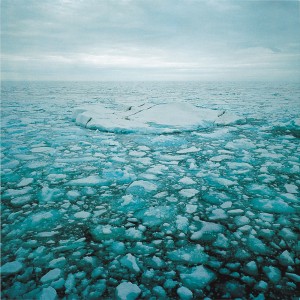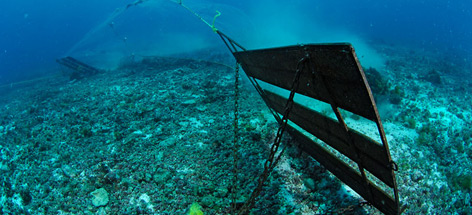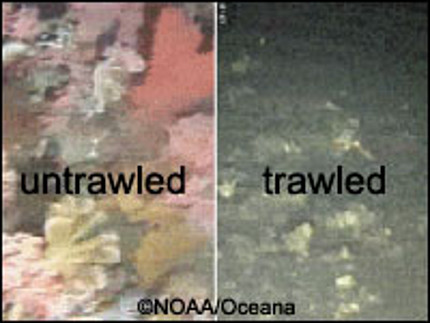Watch this video . . .
. . . before Monday, Sep. 16th.
Sep
11
Sep
9
Story is here.
Gotta say, this one looks like the real thing, not like bugs or water drops.
Sep
9
 It looks like the bigfoot population has spread to Nebraska:
It looks like the bigfoot population has spread to Nebraska:
A 15-year-old reported seeing the creature, which he said stood about 7 feet tall on two legs as it ran in front of the vehicle the youth was driving about 5:30 a.m. The creature then disappeared into the trees along the river. (link)
It's not clear from the article whether the 15-year old had been up all night, or whether he or she was up early.
It seems, though, that not all bigfoot reports are genuine Sasquatch sightings:
Luben said he has fielded two previous reports of Bigfoot sightings in his nearly 24 years with Game and Parks. One, he said, turned out to be a rabbit that had left big tracks in the snow. The tracks were misidentified by a Dwight-area resident who had recently moved to the area from Chicago.
Sep
8

The Daily Mail headlines, "And now it's global COOLING! Record return of Arctic ice cap as it grows by 60% in a year," while the Telegraph reports "A cold Arctic summer has led to a record increase in the ice cap, leading experts to predict a period of global cooling."
Sounds like good news for the polar bears, right? I guess those pessimistic eco-scientists were wrong after all.
Or maybe not.
Turns out that 2012 was a banner year for sea ice loss, so no one expected that this season would reach those lows. We find that the sea ice fluctuates with weather, some years there's more, some years there's less. But the overall trend is downward.
Here's a graph that puts it in perspective:
Notice that even though this year's sea ice extent is substantially above last year's, we're still well below the average from last decade, which is below the average from the prior decade, and so on. You can get an even better sense of the annual variability and the trend by looking at this graph of the extent over the past decade.
Dana Nuccitelli at The Guardian does a good job of explaining just how wrong these denialist claims are. And he includes some great animated graphs, which I'm placing below the fold, since I wouldn't want them to get lost.
Read more »
Sep
4

Many are the instances of business people not liking what scientists say. And if there's money involved, when people don't like what's being said, they sometimes try to keep scientists from saying it.
In this case, the issue is a proposed ban on deep-sea trawling:
Lobbying groups have threatened legal action against scientists for publishing data deemed to be critical of the industry. The EU Fisheries Committee includes Members of the European Parliament from French, UK and Spanish areas in which deep-sea fishing vessels are docked. These ties have slowed the committee’s consideration of the proposed ban to a crawl.
(From Deep Sea News)
 Denialism trying to silence scientific research? Or environmental activists fraudulently posing as scientists? How are we to decide?
Denialism trying to silence scientific research? Or environmental activists fraudulently posing as scientists? How are we to decide?
Sep
3

Earlier this year, young Earth creationist (and founder of Answers in Genesis and the Creation Museum) Ken Ham took issue with teenager Zack Kopplin's arguments against allowing creationism in public school classrooms.
Ham claims that Kopplin and other public school students are "being brainwashed with evolutionary ideas." He also argues that there is an important distinction between "historical science" and "operational (observational) science."
Operational science is indeed observable, testable, falsifiable, and so on—but none of those words describes evolutionary ideas! While biblical creation may not be provable through tests and observation, neither is molecules-to-man evolution (or astronomical evolution). (Source)
(Note too that Ham challenges Kopplin to a debate. )
John Wilkins today addresses this creationist line of argument and points out that science doesn't shy away from historical facts:
We will never know for certain if this or that ancestor existed in one way or another, but we have perfectly reasonable grounds for thinking there was an ancestor, in part because we have seen speciation (the splitting of one species into two) in the modern period, but also because we have firm grounds for thinking this theory (of common descent) explains adequately and without trouble the observed relationships of modern organisms. (Link)
Notice that the form of scientific inference that Wilkins seems to have in mind here is inference to the best explanation.
Wilkins also provides a link to the National Center for Science Education (NCSE) discussion of "historical" vs."experimental" science (which includes some good quotations from Eliot Sober).
Sep
1
 Matt Ridley has published an opinion piece at the Wall Street Journal, and a follow up piece on his blog, in which he tells us that scientific consensus doesn't matter, only scientific evidence does.
Matt Ridley has published an opinion piece at the Wall Street Journal, and a follow up piece on his blog, in which he tells us that scientific consensus doesn't matter, only scientific evidence does.
Phil Plait takes him to task for relying on "evidence" from denialist sources.
While Plait is certainly right here, there is a real philosophical issue that deserves our attention. Because Ridley is also right that what really matters is evidence, not the opinions of scientists.
The underlying question here is when is an argument from authority a fallacy, and when is it a legitimate form of reasoning?
In general, if you're not an expert and you're ignorant of (or don't understand) the evidence in favor of some claim, it makes sense to trust the consensus opinion of the experts. If we didn't do this, we would end up radical skeptics. We trust the judgement of doctors when it comes to questions of medication, we trust engineers about the safety of bridges, and so on.
But it's also true that when we have experts debating the quality and force of evidence, the question of what's the current scientific consensus shouldn't decide the debate. And if we have experts arguing on both sides of some issue -- and there is no established consensus -- then there is no authority that we as non-experts can appeal to.
But what about Ridley's suggestion that we trust the experts about the data, but that he reserves for himself the right to judge the interpretations offered to account for the data. Is this reasonable?
It seems to me that it depends on whether you're actually in a position to reliably make those judgments. This, of course, is a difficult task (cf. Socratic Humility and the Dunning-Kruger effect); we are likely to overestimate our own cognitive abilities and downplay those of others.
To reliably take on the burden that Ridley suggests we (or at least he) should take on, we'd have to be able to:
1. Make sure we have all the relevant data.
2. Be able to sort out good sources of evidence from bad sources (e.g., avoid denialist sources).
3. Be in a position to understand what sort of inferences the data justify. (Note that scientists undergo years of difficult and rigorous training to develop this ability.)
And so on. (Homework assignment: Come up with three more features that are relevant to the question of whether a person should consider herself well-positioned to reject a scientific consensus.)
Note that it seems that Ridley may have fallen down on point 2, since he seems to be trusting denialist sources -- which is the point that Plait is hammering on.
Aug
29
Aug
9
This one in Naples, Florida.
Fortunately, the video "was sent to "MOUFON", a UFO organization, in Ohio, where it's being analyzed. " Hopefully they'll be able to determine whether these really were aliens.
You can find the story here.
Aug
8
The warming waters in the Gulf of Maine have led to record catches recently:
“For decades, the lobster catches in the Gulf of Maine were very steady at about 20 million pounds per year. . . . Then they jumped to 40 million pounds per year and last year we landed a record 125 million pounds of lobsters.
The problem is, the water is going to keep getting warmer. And once it gets too warm, the lobster can't survive.
“Anything above 20º C is extremely stressful for lobsters. . . . Since 2004 the pace of warming has picked up substantially, to about 0.26ºC per year.
The lobster stocks off of Rhode Island and Connecticut are already decimated. Massachusetts will be next. And then Maine.